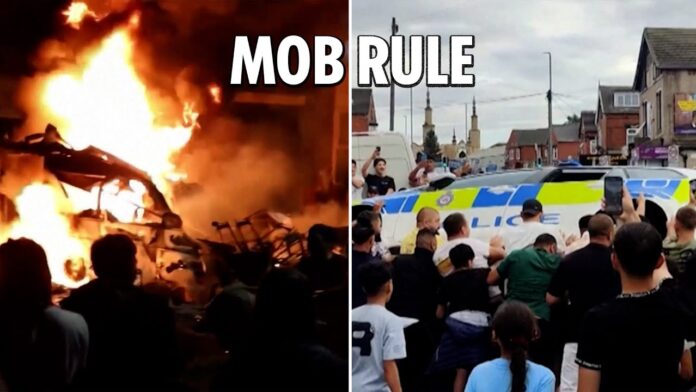Violence erupts in Harehills as rioters overturn police cars and clash with law enforcement in an hours-long confrontation
Leeds has been plunged into chaos as a violent mob wreaked havoc on the streets of Harehills, a suburb in the northern city, in a disturbing display of unrest. The violence erupted around 5 PM on Thursday, July 18, and quickly escalated into a protracted riot.
The scene was captured in shocking footage shared widely on social media. In the midst of the riot, gangs of youths targeted a police car, which still had officers inside. The mob’s rage was palpable as they smashed the car’s windows with various objects, including a child’s scooter. The vehicle was eventually overturned by the rioters, demonstrating the intensity of the violence.
As the unrest continued, additional police officers were deployed to the area in an effort to control the situation. However, the large and aggressive crowd made it challenging for law enforcement to regain control. The streets of Harehills were filled with chaos as rioters clashed with the police, leading to a scene of significant disorder and destruction.
The confrontation between the mob and the police lasted for several hours, with the violence showing no signs of abating. The incident has caused widespread concern and distress among residents and has drawn attention from various news outlets. The motives behind the riot remain unclear, but the scale of the violence underscores a serious breakdown in public order.
Analysis:
Political:
The riots in Leeds highlight underlying tensions and potential failures in local governance and policing strategies. The severity of the violence and the need for a large police response suggest significant issues with community relations and law enforcement effectiveness. This event may prompt a political response in terms of reviewing and potentially reforming policing policies and community engagement strategies.
Social:
The riot reflects deeper social issues within the community, such as disenfranchisement, inequality, or dissatisfaction with local services or authorities. The involvement of young people and the nature of the violence suggest a potential breakdown in social cohesion. The incident could lead to broader discussions about social support systems, youth engagement, and community relations.
Racial:
While the specific racial dynamics of the riot are not detailed, such events can often intersect with racial and ethnic tensions. The focus on the Harehills area, which has a diverse population, might suggest underlying racial or ethnic issues contributing to the unrest. Addressing these factors would be crucial in preventing similar incidents in the future.
Gender:
The involvement of youths, including potentially young men, in the violence could reflect gender dynamics within the community. Understanding the role that gender plays in such disturbances can be important for developing targeted interventions and support programs for young people.
Economic:
The economic impact of the riots is significant, with potential damage to property and disruption of local businesses. The cost of repairing or replacing damaged police vehicles and addressing any subsequent property damage will be substantial. Additionally, the riot could affect local businesses and the overall economic stability of the area, highlighting the broader economic repercussions of civil unrest.
Technological:
The role of social media in spreading footage of the riot underscores the impact of technology on modern protests and disturbances. The rapid dissemination of images and videos can amplify the impact of such events, influencing public perception and potentially escalating tensions. The use of technology in documenting and sharing the incident also raises questions about privacy and the role of digital media in conflicts.
